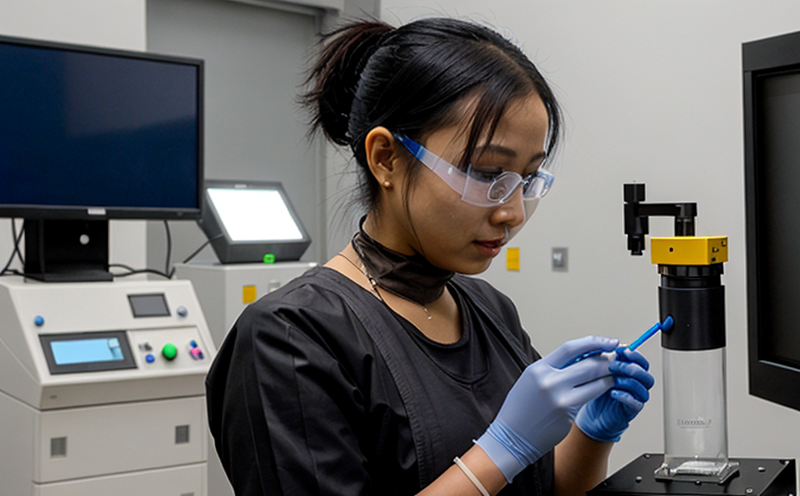JIS K0102 Testing of Industrial Wastewater Containing Nanoparticles
The Japanese Industrial Standard (JIS) K0102 is a stringent testing protocol designed to assess the environmental impact of industrial wastewater containing nanomaterials. This standard is particularly relevant for industries involved in manufacturing, electronics, and other sectors where nanoparticles are used or produced as by-products.
Industrial wastewater can contain various types of nanoparticles with diverse properties, including size, shape, surface chemistry, and aggregation states. These characteristics significantly influence the nanoparticle's environmental fate and potential ecological risks. Accurate assessment is crucial to ensure compliance with regulatory standards and to promote sustainable practices in industrial operations.
The testing procedure outlined in JIS K0102 involves several critical steps:
- Sample Collection: Samples are collected from the wastewater stream at representative locations. This ensures that the sample accurately reflects the overall composition of the wastewater.
- Preparation: The collected samples undergo thorough preparation to ensure they are in a suitable state for analysis. This may include filtration, dilution, and stabilization processes.
- Analytical Techniques: A range of analytical techniques are employed to characterize the nanoparticle content. These include transmission electron microscopy (TEM), dynamic light scattering (DLS), zeta potential measurement, and inductively coupled plasma mass spectrometry (ICP-MS).
- Assessment Criteria: The results from these analyses are used to determine whether the nanoparticle concentrations meet the specified limits set forth by JIS K0102.
The testing protocol is designed to identify and quantify nanoparticles that could potentially pose risks to aquatic ecosystems. By adhering to this standard, industries can ensure they are minimizing their environmental footprint and complying with regulatory requirements.
For more detailed information on the specific parameters involved in JIS K0102 testing, refer to the table below:
| Parameter | Description | Units |
|---|---|---|
| Nanoparticle Size Distribution | Range of particle sizes present in the sample | nm (nanometers) |
| Zeta Potential | Metric indicating nanoparticle stability and charge properties | mV (millivolts) |
| Particle Concentration | Total number of particles per unit volume | particles/mL |
| Surface Area | Total surface area of all nanoparticles in the sample | m2/L (square meters per liter) |
The importance of JIS K0102 testing cannot be overstated, especially for industries dealing with nanomaterials. By conducting this testing, companies can:
- Evaluate the environmental impact of their operations.
- Ensure compliance with international standards and regulations.
- Promote sustainable practices by minimizing environmental risks.
- Gain a competitive edge through enhanced reputational capital.
In conclusion, JIS K0102 testing is an essential tool for industries working with nanomaterials to ensure they are meeting the highest standards of environmental responsibility and compliance. Proper execution of this protocol can lead to significant long-term benefits for both companies and the environment.
Applied Standards
The testing conducted under JIS K0102 is based on several international and national standards that provide a comprehensive framework for assessing nanoparticle concentrations in industrial wastewater. These include:
- JIS K0102: Industrial Waste Water Containing Nanoparticles - This Japanese standard specifies the methods for measuring the concentration of nanoparticles in industrial waste water.
- ISO 17253-1/2 - International standards that cover the quantification and characterization of nanomaterials.
- ASTM E2864 - American standard for the determination of nanomaterials in water samples.
The combination of these standards ensures a robust, consistent approach to testing nanoparticle concentrations. This multi-standard methodology is crucial for achieving accurate and reliable results that can be trusted by all stakeholders involved.
Eurolab Advantages
At Eurolab, we pride ourselves on offering comprehensive and cutting-edge testing services for industrial wastewater containing nanoparticles. Our advantages include:
- Experienced Professionals: Our team comprises highly skilled scientists with extensive experience in nanotechnology and environmental science.
- State-of-the-Art Facilities: We utilize the latest instrumentation and technology to ensure precise and accurate testing results.
- Comprehensive Reporting: Our reports provide detailed insights into nanoparticle characteristics, concentrations, and potential risks.
- Dedicated Client Support: We offer personalized support throughout the testing process, ensuring clients understand their results and recommendations for improvement.
- Regulatory Compliance: Eurolab ensures all our tests meet or exceed international standards, providing peace of mind to our clients.
- Sustainability Focus: Our services are designed to promote sustainable practices by minimizing environmental impact.
By choosing Eurolab for your JIS K0102 testing needs, you can be confident in the quality and accuracy of our results. Our commitment to excellence ensures that you receive the best possible service tailored specifically to your requirements.





